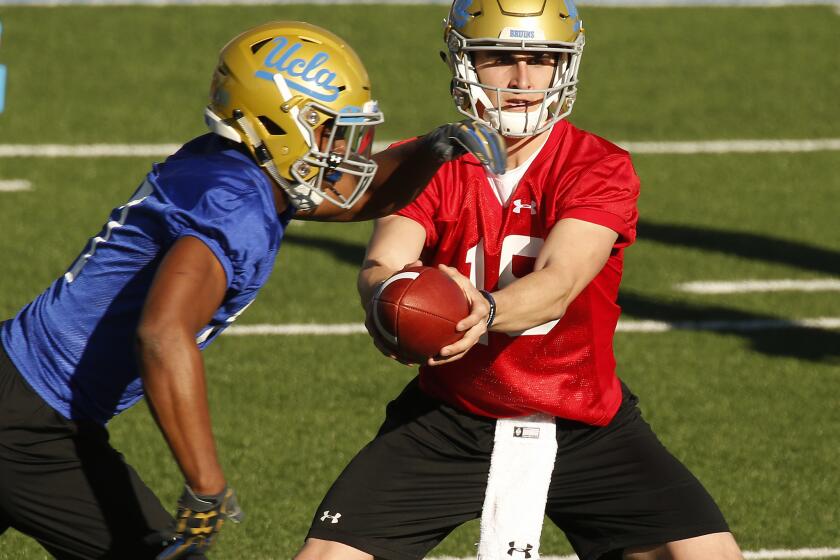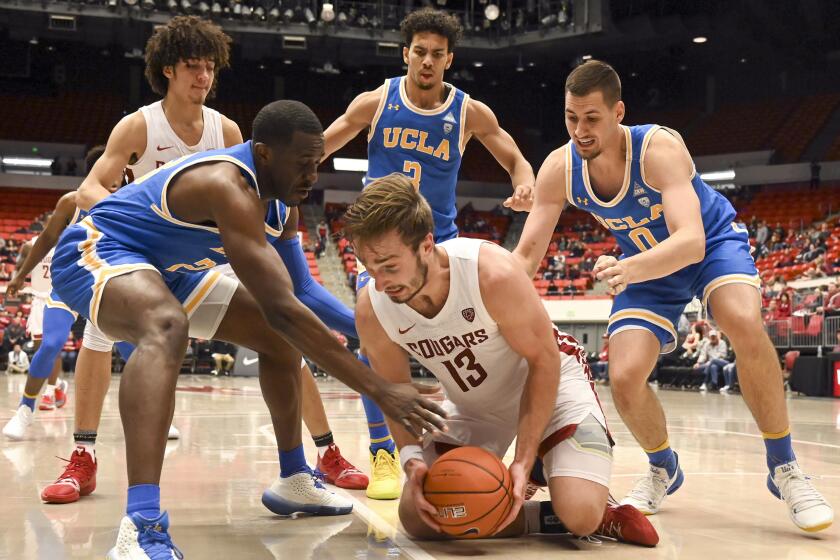It has been nine decades since UCLA’s football and men’s basketball teams were this bad
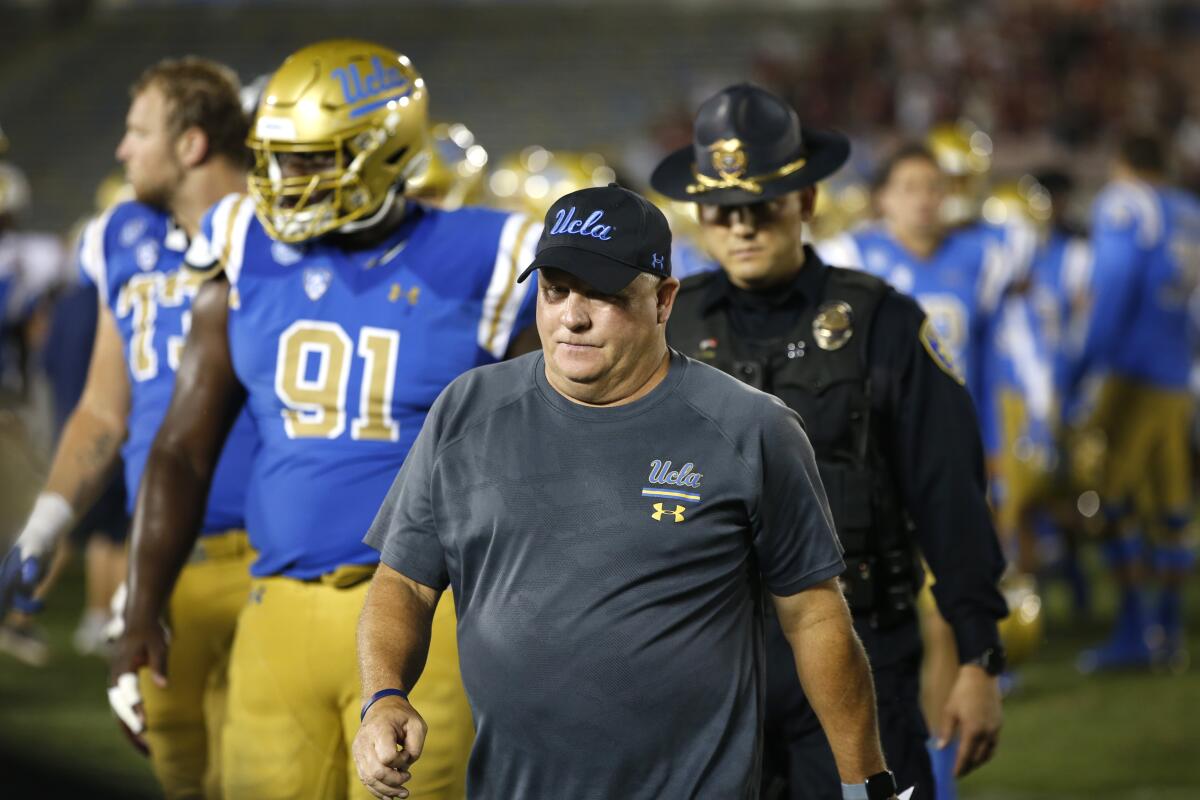
- Share via
Sal Malad used to camp out for UCLA basketball tickets, soak in ecstasy or despair based on the outcome of the Bruins’ football game against USC, fixate on every game until the final second.
In recent years, he has felt something less than a blue-and-gold obsession.
“Completely desensitized,” Malad, a UCLA alumnus who lives in Lafayette, La., said of his sentiment toward the school’s two major sports.
Malad switched television channels while watching UCLA’s recent loss to the Trojans in football and could only make it through about half of the Bruins’ setback against North Carolina in basketball.
“I had seen enough,” Malad said.
For scores of UCLA fans, those teams have provided must-flee TV during what could be described as the dark ages for Bruins football and basketball. It’s an abyss of failure that goes beyond a lack of Rose Bowls and Final Fours, the football team producing four consecutive losing seasons for the first time since the 1920s and the basketball team inspiring its brand of March Madness by continually being irrelevant during the sport’s biggest month.
“I would say this is an all-time low,” said Malad, a student during the high of the 1995 national basketball championship. “For me, as a fan, watching the two sports together, in the modern history of UCLA football and basketball, I can’t recall a worse time.”
The UCLA football players already in the transfer portal were joined Tuesday by tight end Matt Lynch, the 10th Bruin to explore a move elsewhere.
A generation of UCLA fans has grown up watching its teams miss out on New Year’s Day bowl games. Your birthday must be on or before Jan. 1, 1999, to have been alive during the Bruins’ last appearance in a Rose Bowl. Some teenagers can barely recall the Bruins playing in the 2008 Final Four, their most recent appearance on college basketball’s biggest stage.
Fans have dispersed accordingly, the football team averaging a record-low 43,849 spectators last season at the Rose Bowl and the basketball team averaging only 5,603 at Pauley Pavilion through its final nonconference game, a loss to Cal State Fullerton.
“Everybody knows we’re never going to have the John Wooden days again,” said Jim Bendat, a Bruins fan since 1959, well before the first of Wooden’s 10 national titles, “but you still want to field a competitive team that won’t lose at home to Belmont and Liberty and Hofstra. That should not be happening.”
UCLA losses to mid-majors are becoming as commonplace as eight-claps. The football team lost to San Diego State on Sept. 7 for the first time in 23 meetings dating to the 1920s, part of a two-year stretch in which coach Chip Kelly is 0-4 against Group of Five opponents and 7-17 overall.
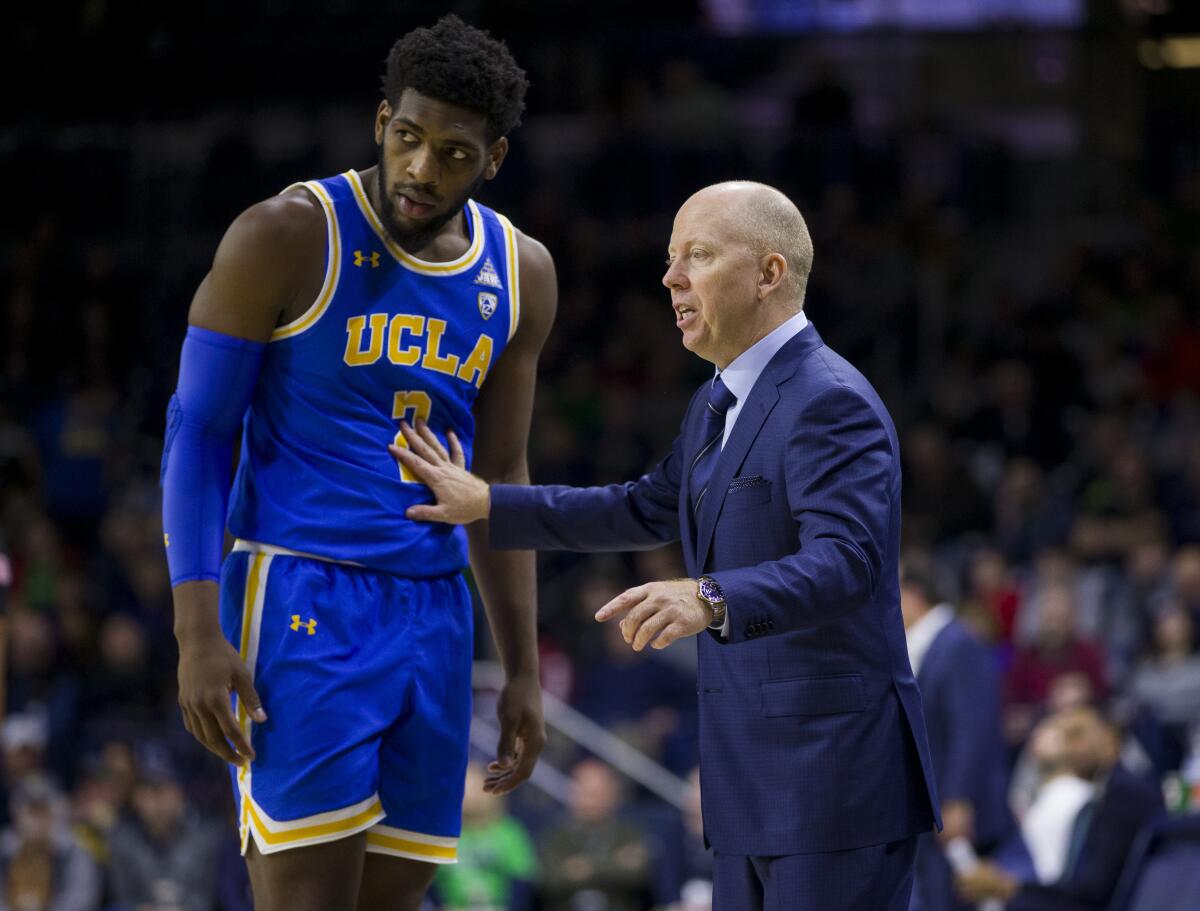
The basketball team has two home losses against mid-major teams and appears bound to be out of the NCAA tournament for a second consecutive season. New coach Mick Cronin recently made players and coaches complete practices without any UCLA logos on their workout apparel, signaling they were not worthy of the school’s unparalleled legacy in the sport.
Things are so wonky it’s as if UCLA < UCLA.
Spencer Stueve, who has written encyclopedias on UCLA’s football and basketball teams and could be considered the school’s de facto sports historian, said the Bruins haven’t experienced this sort of downturn in both sports simultaneously since the 1930s, when they struggled to find their footing as new members of the Pacific Coast Conference.
UCLA’s basketball team posted only one winning record that decade and the football team routinely finished in the middle or toward the bottom of its conference with the exception of 1935, when it tied Stanford and California for first place.
“Give people a reason to get back in the seats. Seeing the Rose Bowl at half-capacity for my final three years was probably the most disappointing part of my time here from a fan’s perspective.”
— Ryan Smith, UCLA student
Of course, fan expectations were lower in those days. The Bruins’ basketball coach, Caddy Works, was a full-time lawyer and the football team was so soundly beaten by USC in the first two crosstown rivalry games, in 1929 and 1930, that UCLA abandoned the series for five years.
“UCLA was pretty new and irrelevant in sports back then and there was no expectation, there wasn’t even a hope,” said Bendat, something of a history buff who has collected a program from every football game in the crosstown rivalry. “That’s the big difference. Now there might not be expectations, which is sort of sad, but at least there’s hope. There’s always got to be some hope that things are going to be better than they are now.”
The Bruins’ basketball victory over defending Pac-12 Conference champion Washington on the road last week portended a potential breakthrough. Two days later, however, the team went kerplunk during an overtime loss to Washington State.
Hopes remain high for a relatively quick turnaround. Cronin has secured a letter of intent from Daishen Nix, one of the nation’s top high school point guards, as part of his early efforts to get the Bruins back into national relevance.
UCLA allows Washington State to rally and force overtime before giving up the first six points of the extra frame in a 79-71 loss.
The football team’s trajectory appears more uncertain based on another recruiting class with significant personnel gaps and the Bruins’ lack of a clear identity through Kelly’s first two seasons.
Athletic director Dan Guerrero said Tuesday that the extended slump in the major sports resulted in the arrival of Cronin and Kelly, who continue to endure growing pains as part of their transition periods. Guerrero pointed to the unprecedented resources allocated for the coaches, who each is paid a school-record salary in his respective post, as well as their early development efforts as harbingers of success.
While cautioning that turnarounds require patience, Guerrero was unflinching in his support of Cronin and Kelly.
“I’m an alum and I’m the athletic director,” said Guerrero, who will step down at the end of June, “but I’m also a fan and I hired these coaches and I do have to tell you with the highest degree of confidence that I believe in them and while it pains me for 18 years in this chair to end on this note, I believe we’ve put these programs in position to really see success in the future and I will celebrate that success as a fan when that happens.”
In recent years, UCLA fans thirsting for success have found a quencher in the women’s sports. The gymnastics team won a national championship in 2018, the softball and beach volleyball teams won national titles in 2019, and the basketball team is undefeated approaching the season’s midpoint.
But even the Bruins’ success in the nonrevenue sports has diminished; UCLA’s 14 NCAA championships over the last decade were its fewest since it won 10 during the 1960s. Only a few years removed from being tied with Stanford for the most NCAA championships in the history of major college athletics, the Bruins trail the Cardinal 126-118.
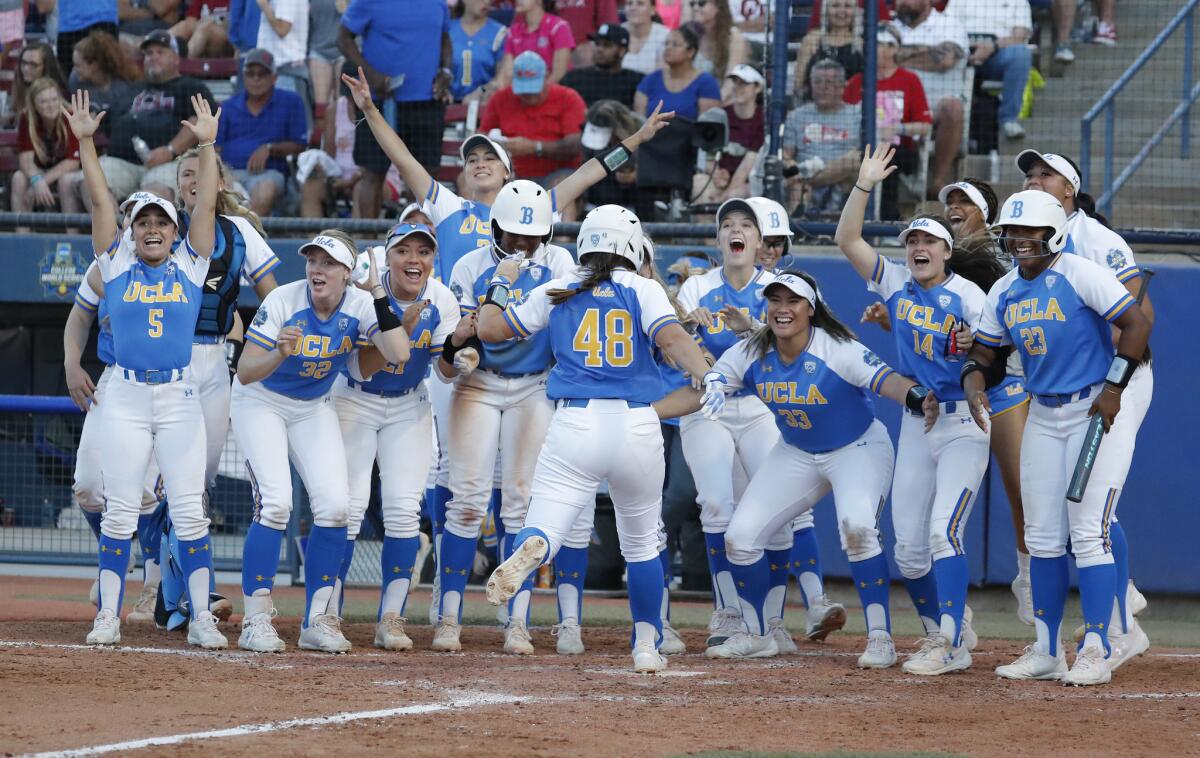
It can be hard to be a UCLA fan these days, even among those whose allegiances are unlikely to change.
“I just want the major sports to be exciting,” said Ryan Smith, a UCLA senior communications major. “Give people a reason to get back in the seats. Seeing the Rose Bowl at half-capacity for my final three years was probably the most disappointing part of my time here from a fan’s perspective.”
Those who have followed the basketball team know how quickly things can change. The Bruins went from 15-17 to 31-5 during point guard Lonzo Ball’s one college season in 2016-17, jamming Pauley Pavilion over the final months.
It was the first and last time that Smith experienced the sort of fun that would make a student want to come back to watch UCLA sports as an alumnus.
“That feeling has been lost ever since,” Smith said. “Future generations of Bruins deserve to feel that magic that I did for a brief time.”
More to Read
Go beyond the scoreboard
Get the latest on L.A.'s teams in the daily Sports Report newsletter.
You may occasionally receive promotional content from the Los Angeles Times.

